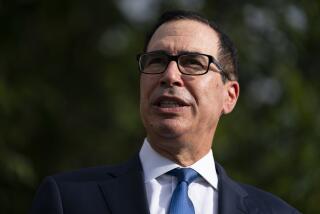Alibaba plans IPO in U.S., not Hong Kong
The largest tech IPO of the year — and perhaps of all time — isn’t coming from Silicon Valley.
Alibaba, a Chinese e-commerce behemoth with more sales than Amazon and EBay combined, has decided to go public on Wall Street after months of speculation that it would list in Hong Kong. The company could raise $15 billion at an estimated valuation of up to $200 billion.
“We expect it to be the largest tech IPO ever, the largest IPO of the year, the largest Chinese IPO of the year,” said Max Wolff, chief economist and strategist at Citizen VC. “It’s a big number, probably a record-breaker by any metric.”
Alibaba’s initial public offering plans are part of a wave of Chinese companies going public in the U.S. this year. Twitter-like platform Weibo is set to begin trading on the Nasdaq on Thursday, and Alibaba rival JD.com filed for a $1.5-billion listing in January.
The prospect of a blockbuster Alibaba IPO is already igniting the kind of frenzied investor interest that swirled around Facebook in 2012 and Twitter in 2013.
Alibaba is often compared to EBay and PayPal, but its interests are much wider. They include banking, maps, cloud computing, online music service, and TV and film production. The company also has a stake in microblogging platform Weibo.
The company has no immediate plans to compete with America’s tech stalwarts in the U.S. market, analysts say. It still sees huge opportunities for growth in China, where the vast majority of sales are still offline and half the population has yet to connect to the Internet.
But the massive cash infusion and recent acquisitions will strengthen its position against U.S. companies trying to take on Alibaba in China. Alibaba already controls about 80% of the e-commerce market there, and efforts by Amazon to gain a foothold have so far fallen flat.
“At some point, for them to continue to grow, they’re going to want to have interest in expanding into the U.S. marketplace,” said Colin Gillis, an analyst at BGC Financial. “By listing, they’ll build some name recognition at the very least.”
Alibaba was founded in 1999 by a group of 18 people, led by Jack Ma, a former English teacher from Hangzhou, a city near Shanghai. Yahoo was an early investor and still owns about a quarter of the company; Japan’s SoftBank has a 37% share.
When Yahoo reported quarterly earnings Tuesday, it revealed that revenue at Alibaba surged 66%, to $3.06 billion, in the fourth quarter compared with a year earlier. Its net income more than doubled to $1.36 billion. That makes Yahoo’s stake worth $42 billion — more than Yahoo’s own market capitalization, according to an estimate by private company financial intelligence provider PrivCo.
“Yahoo made a huge and, in retrospect, very smart investment in Alibaba when Alibaba was very small and Yahoo wasn’t,” Wolff said.
Now the reverse is true: Yahoo’s dominance has faded, and Alibaba has grown into a powerhouse.
Going public in the U.S. has become an attractive option for Chinese companies, particularly those in tech. Stock exchanges in mainland China are struggling and subject to restrictive controls.
Alibaba seriously weighed a listing in Hong Kong for months. But the company wanted to allow its founders and top management to nominate most board members despite holding a minority stake. The Hong Kong stock exchange refused to grant the exemption because the Securities and Futures Commission felt it would violate the one-share-one-vote principle.
In the U.S., Alibaba’s 28 top partners — which collectively hold roughly a 10% stake in the company — would have the right to nominate a majority of the board, which would then be subject to a shareholder vote.
Also tipping the scales in favor of the U.S.: American exchanges offer a better trading infrastructure and valuations that are typically higher than in Hong Kong or mainland China, said Josef Schuster, founder of IPO research and investment house IPOX Schuster in Chicago.
Chinese companies prepping to go public are also encouraged by the trading gains of several recent companies that have chosen to list outside of mainland China, he said.
“Chinese firms are taking advantage of the U.S. market right now because the IPO market has been quite hot,” Schuster said. “The fact that you have seen so many huge winners just increases the confidence about future IPOs out of China going public here.”
Alibaba spokeswoman Ashley Zandy declined to comment on whether the company had hired banks to manage the deal, decided on an exchange or set a timeline to file. Analysts are predicting the company could file as early as this month and go public in the fall.
Alibaba has recently been scooping up stakes in companies to bulk up its portfolio before going public.
Last month the group announced it would invest about $692 million in Chinese department store chain Intime Retail Group to grow its presence in the bricks-and-mortar space. It also led a $280-million round of financing for messaging app Tango. More recently it acquired mapping and navigation company AutoNavi.
“Ultimately the idea becomes trying to control an entire industry chain,” said Mark Natkin, founder and managing director of Marbridge Consulting in Beijing.
Going public in the U.S. will also help Alibaba, Weibo and JD.com build brand awareness in the world’s No. 1 economy.
Weibo — commonly called China’s version of Twitter — allows people to share opinions, news, photos and jokes. Users can follow one another, and many celebrities and corporations maintain accounts.
Weibo launched in 2009 after the government started blocking Western social media sites. The government allows Weibo to operate because it agrees to censor user content.
JD, or Jingdong, is an e-commerce rival to Alibaba’s Tmall, selling electronics and other goods directly to consumers from its own warehouses — like Amazon in the U.S. The company last year had 47.4 million active customer accounts and sold $20.7 billion worth of goods, according to its IPO filing. As of the end of February, it operated 82 warehouses in 34 cities and had more than 20,000 delivery people.
In China, those companies have already become an essential part of many people’s lives.
Hu Jinwei, 30, of Wenzhou runs a shop on Taobao, Alibaba’s biggest website and China’s largest consumer-to-consumer online shopping platform. He peddles cellphones, Bose stereos and other products that he buys in the U.S. and resells to Chinese consumers.
Hu got started with Taobao about a decade ago after failing to generate enough sales through his own website. Alibaba, he says, has had a “huge impact on my life.”
Hu said he really didn’t understand why so many Chinese Internet companies wanted to do their IPOs in the U.S. “But if they can raise cash in America and use it to serve Chinese customers,” he said, “that’s good.”
Twitter: @byandreachang, @JulieMakLAT
Chang reported from Los Angeles and Makinen from Beijing.
Tommy Yang in The Times’ Beijing bureau contributed to this report.







